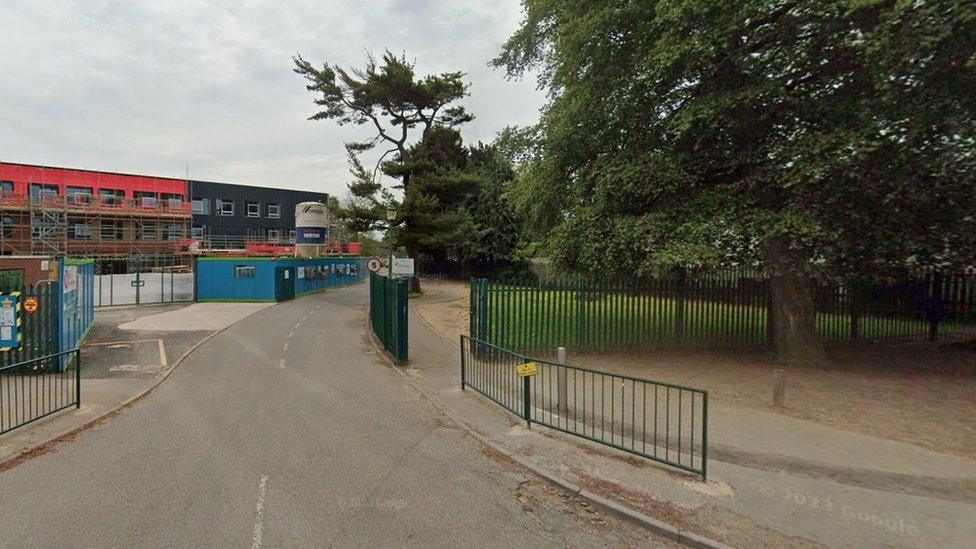Nuneaton school building shut as legionella bacteria found
- Published

The trust said it was doing everything in its power to minimise the impact on pupils’ education (road entrance pictured in May)
The opening of a new school building has been delayed after legionella bacteria was found in the water system.
The new Hartshill Academy in Nuneaton had been due to open on Monday, The Midland Academies Trust (Mat) said.
Hundreds of pupils have been learning remotely while testing work continues to assess the building's safety.
The Department for Education (DfE), which the trust said was in charge of the investigation, said it was working to minimise disruption to learning.
Mat said the earliest it could expect to officially take possession of the new building was 17 November.
In a letter to parents and carers on Friday, seen by the BBC, principal Lorraine Taylor said the academy looked forward to welcoming pupils and staff to the new facilities from 20 November.
Face-to-face lessons
The water system was being cleaned and "will be retested before the move takes place", the trust said.
In the run up to that though, some pupils have been able to use the school's existing building in the mornings, to allow them to take part in face-to-face lessons, for the first time since 16 October.
Children in years seven to 10 have been learning remotely, although those in Year 11 were able to do mock GCSE exams in the sports hall.
A spokesperson said only when the DfE was satisfied the building "is ready for occupation, will we be able to complete the handover process".
The school had been unable to move back immediately into the previous building, as this had to be cleared of equipment and furniture, it said.
Interim arrangements include provision for vulnerable pupils and children of key workers to be taught at one of its partner schools.
Mat said it had been working with the DfE and others to restore online facilities and return furniture to part of the existing building, allowing pupils to study face-to-face in the mornings.
One parent, who asked to remain anonymous, said the school had failed to take into consideration children from a disadvantaged position and the consequences for them were "dire".
"Having wi-fi in the home is a luxury for many families, as are contract mobile phones with available data," they said.
Another, who explained they were a single working parent, added they had found the whole process "very stressful".
'Mobilised resources'
The spokesperson said: "We have mobilised all available resources to address the situation effectively and continue to explore every possible option."
The DfE said "trace elements" of legionella bacteria "were discovered by Wates Construction in isolated areas of the water system of the new building".
"They are working on eliminating the legionella bacteria in a controlled way," a spokesperson said.
"We are working closely with the trust to minimise disruption to pupils' learning and ensure the new building is safe for pupils to return as soon as possible."
A spokesperson for Wates, said: "Safety is the number one priority across all our projects and as part of this we routinely carry out water quality tests before handover.
"On this occasion one of these tests has detected trace amounts of legionella bacteria in the water system, and our team is working to eradicate the bacteria."

Follow BBC West Midlands on Facebook, external, X, external and Instagram, external. Send your story ideas to: newsonline.westmidlands@bbc.co.uk, external